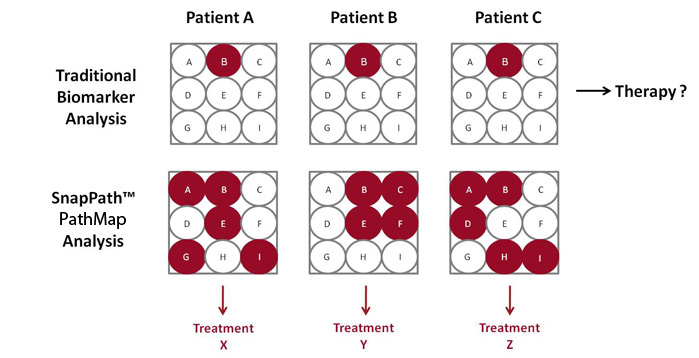PathMAP® profiles reveal information regarding signal transduction networks, including pathway activation and feedback loops, that predict patient response to targeted drug therapy. Enabled by the SnapPath Cancer Diagnostics System, PathMAP® profiles are algorithm-based tests that compare stimulated/inhibited patient samples to unstimulated, basal samples. These profiles utilize phosphoprotein-based ex vivo biomarkers to yield functional information beyond what can be achieved with traditional static DNA/RNA biomarkers in dead tissue.

Ex vivo Biomarkers
Ex vivo biomarkers are dynamic molecular markers, such as phosphoproteins, that are evoked from live tumor cells after being removed from a patient. Unlike static biomarkers detected from FFPE-based tumor samples, ex vivo biomarkers enable true functional tests of cancer cells and reveal important elements of tumor cell biology, including signal transduction circuitry. SnapPath® is an enabling platform for this new class of biomarkers, including ex vivo-based companion diagnostics.
Much of the early work in ex vivo biomarkers was pioneered in leukemia and lymphoma. BioMarker Strategies has extended this work to solid tumors using the SnapPath® live tumor testing platform. Most recently, the company published a paper highlighting its preclinical and clinical proof-of-concept data in the peer-reviewed journal, PLoS ONE. Additionally, the company ’s scientific work has been accepted as abstract presentations at the 2013 AACR meeting (Abstract), 2012 International Melanoma Congress meeting (Abstract), 2012 AACR meeting (Abstract), and 2010 San Antonio Breast Cancer Symposium.
|






